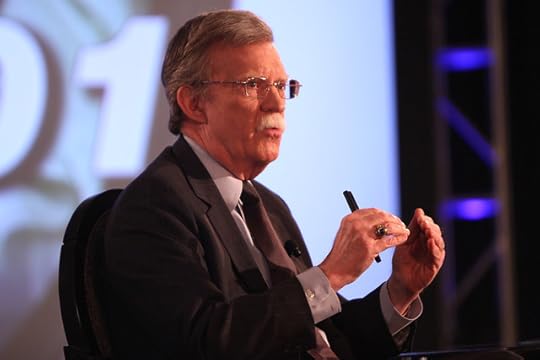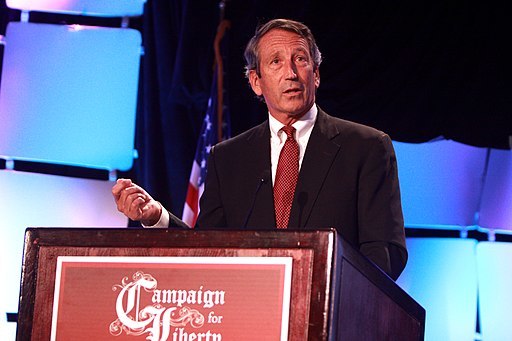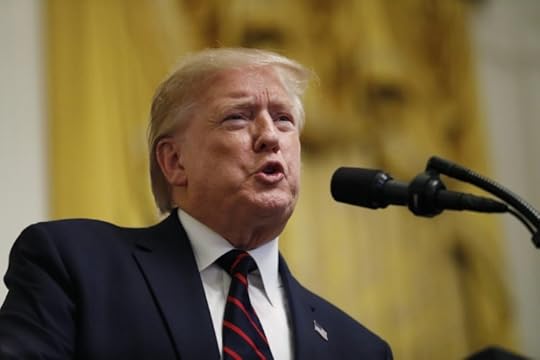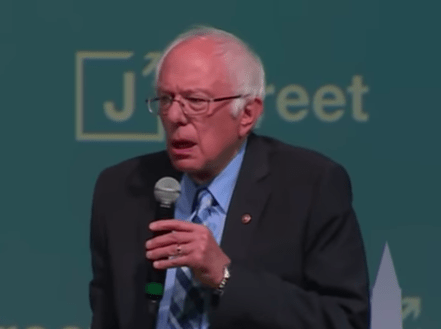Chris Hedges's Blog, page 105
November 13, 2019
Cuba’s Ingenious Lesson for Cities Facing Hunger
When countries run short of food, they need to find solutions fast, and one answer can be urban farming.
That was the remedy Cuba seized with both hands 30 years ago when it was confronted with the dilemma of an end to its vital food imports. And what worked then for Cuba could have lessons today for the wider world, as it faces growing hunger in the face of the climate crisis.
When the Soviet Union collapsed in the 1990s, most of Cuba’s food supplies went with it. To stave off severe malnutrition the people of the capital, Havana, found an imaginative answer: urban gardening. That’s now seen as a possible blueprint for the survival of city populations in a warming world.
Related Articles

Cuba Is Feeling John Bolton's Wrath
by
Trump Cracks Down on Cuba, Nicaragua and Venezuela
by

U.S. to Allow Lawsuits Over Properties Seized by Castro's Cuba
by
The Rapid Transition Alliance has published a longer account of Cuba’s very fast move towards self-sufficiency as part of its series Stories of Change, which describes cases of large-scale, rapid transformation that can seem difficult to achieve but which have often worked before.
The problem of hunger for the Cubans arose because during the Cold War they had stopped producing food of their own and turned over most of their farmland to sugarcane plantations to supply the Soviet Union. In return for these mountains of sugar Moscow provided Cuba with food, chemical fertilisers and fuel oil for its cars and tractors.
U.S. Sanctions
The Soviet collapse brought the breakdown of this trade, and food rationing for city dwellers. And Cuba lost its main food supply while it was still coping with strict US sanctions. Reverting to conventional farming would have taken time and was in any case difficult because the Soviet fertilisers, fuel and pesticides had also dried up.
So the highly-educated urban citizens, faced with rationing which reduced the average Cuban’s daily calorie intake from 2,600 in 1986 to 1,000-1,500 in 1993, organised themselves to grow their own food in improvised urban allotments.
At first, struggling with little know-how and without fertilisers, their yields were low, but by producing compost and other organic growing mediums, plus introducing drip-fed irrigation, they began to see improvements.
Short of chemicals, the gardeners resorted to biological controls like marigolds (where opinions today are mixed) to deter harmful insects.
By 1995 Havana alone had 25,000 allotments tended by families and urban cooperatives. The government, realising the potential benefits, encouraged the movement.
Soil quality was improved with a mixture of crop residues, household wastes and animal manure to create more compost and soil conditioners. The extra fresh vegetables and fruit this provided quickly improved urban dwellers’ calorie intake and saved many from malnutrition.
In the Cuban climate, with irrigation changes and soils undergoing constant improvement from added organic matter, the allotments could produce vegetables all year round. Lettuce, chard, radish, beans, cucumber, tomatoes, spinach and peppers were grown and traded.
There is evidence as well that the extra exercise which these urban gardeners got from tending their allotments, plus the time they spent outdoors in the open air, benefited their health.
Eventually, realising that self-sufficiency was the only way to feed the population, the government banned sugarcane growing altogether. Lacking fertiliser, many former plantations were turned over to organic agriculture. The shortage of oil for tractors meant oxen were used for ploughing.
Partial Solution
Cuba’s experience of urban agriculture inspired many environmentalists to believe that this is at least part of the solution to the food shortages threatened by climate change. By 2008 food gardens, despite their small scale, made up 8% of the land in Havana, and 3.4% of all urban land in Cuba, producing 90% of all the fruit and vegetables consumed.
As a result the calorie intake of the average Cuban quickly rose to match that of Europeans, relying on a diet composed mainly of rice, beans, potatoes and other vegetables – a low-fat diet making obesity rare.
Because of the climate, though, wheat does not grow well in Cuba, and the island still has to import large quantities of grain for bread. Meat is in short supply and also has to be mainly imported.
Despite this, Cuba’s experience since the Cold War ended in the 1990s shows that large quantities of fresh food can be grown in cities and that urban agriculture is sustainable over decades.
For other countries vulnerable to sudden loss of food supplies, Cuba’s experience suggests that urban farming can be one way of staving off potential famine when imports are restricted, expensive or simply unobtainable.

November 12, 2019
Court: Warrantless Searches of Phones Violate Fourth Amendment
BOSTON — A federal court in Boston has ruled that warrantless U.S. government searches of the phones and laptops of international travelers at airports and other U.S. ports of entry violate the Fourth Amendment.
Tuesday’s ruling in U.S. District Court came in a lawsuit filed by the American Civil Liberties Union and the Electronic Frontier Foundation on behalf of 11 travelers whose smartphones and laptops were searched without individualized suspicion at U.S. ports of entry.
ACLU attorney Esha Bhandari said the ruling strengthens Fourth Amendment protections of international travelers who enter the United States every year.
The ACLU describes the searches as “fishing expeditions.” They say border officers must now demonstrate individualized suspicion of contraband before they can search a traveler’s device.
The government has vigorously defended the searches as a critical tool to protect America.
The number of electronic device searches at U.S. ports of entry has increased significantly, the ACLU said. Last year, the government conducted more than 33,000 searches, almost four times the number from just three years prior.
Documents filed as part of the lawsuit claim the scope of the warrantless searches has expanded to assist in enforcement of tax, bankruptcy, environmental and consumer protection laws, gather intelligence and advance criminal investigations.
The court documents also said agents with U.S. Customs and Border Protection and U.S. Immigration and Customs Enforcement consider requests from other government agencies in determining whether to search travelers’ electronic devices. They added that agents are searching the electronic devices of not only targeted individuals but their associates, friends and relatives.
“By putting an end to the government’s ability to conduct suspicionless fishing expeditions, the court reaffirms that the border is not a lawless place and that we don’t lose our privacy rights when we travel,” Bhandari said in a press release.

Horrifying Emails Reveal Stephen Miller’s White Nationalism
Trump White House senior adviser Stephen Miller, as The Washington Post reported in August, “rarely puts anything in writing, eschewing email in favor of phone calls.” Despite making extensive anti-immigration comments in high school, and being, as the Guardian pointed out in 2017, “the architect of the first travel ban,” there has been little written evidence of Miller’s white nationalist views, aside from college newspaper columns and emails to reporters while an aide to then-Sen. Jeff Sessions. Until now.
Hatewatch, a web publication from the Southern Poverty Law Center, obtained 900 leaked emails, which Miller sent to the right-wing website in 2015 and 2016, while he worked for Sessions. Hatewatch’s Michael Edison Hayden explains:
In the run-up to the 2016 election, White House senior policy adviser Stephen Miller promoted white nationalist literature, pushed racist immigration stories and obsessed over the loss of Confederate symbols after Dylann Roof’s murderous rampage. [The emails] showcase the extremist, anti-immigrant ideology that undergirds the policies he has helped create as an architect of Donald Trump’s presidency.
Those policies, Hayden continues, include “reportedly setting arrest quotas for undocumented immigrants, an executive order effectively banning immigration from five Muslim-majority countries and a policy of family separation at refugee resettlement facilities.”
The emails were leaked to Hatewatch by Katie McHugh, a former Breitbart editor who was fired from the site in 2017 for posting anti-Muslim tweets. McHugh has since said she has denounced the far right. McHugh told Hatewatch she was introduced to Miller with the understanding that his ideas would shape her work at Breitbart.
The contents of the emails range from sharing links from white nationalist website VDARE and conspiracy theory site Infowars and anger over Amazon and other sites removing products with the Confederate flag after white nationalist Roof shot nine black people in a Charleston, S.C., church, to recommending that McHugh read “Camp of the Saints,” which Hayden describes as “popular among white nationalists and neo-Nazis because of the degree to which it fictionalizes the ‘white genocide’ or ‘great replacement’ myth into a violent and sexualized story about refugees.”
Miller references the book in the following email chain:
McHugh, Sept. 6, 2015, 3:34 p.m. ET: “[Breitbart editor] Neil [Munro], Julia [Hahn] and I are going to do a series of stories on [nonwhite SAT scores] to break it down. Neil says it’s easier for people to digest that way and change their minds.”
Miller, Sept. 6, 2015, 3:41 p.m. ET: “On the education angle? Makes sense. Also, you see the Pope saying west must, in effect, get rid of borders. Someone should point out the parallels to Camp of the Saints.”
In another thread, Miller backs policies favored by President Calvin Coolidge, who wanted to ban all immigration, in an email with Breitbart’s McHugh, Hahn, and fellow Sessions aide Garrett Murch:
Murch, Aug. 4, 2015, 6:22 p.m. ET: “[Show host] Mark Levin just said there should be no immigration for several years. Not just cut the number down from the current 1 million green cards per year. For assimilation purposes.”
Miller, Aug. 4, 2015, 6:23 p.m. ET: “Like Coolidge did. Kellyanne Conway poll says that is exactly what most Americans want after 40 years of non-stop record arrivals.”
Those examples are only a small snapshot of the comments leaked to Hatewatch, and of the depth of Miller’s reviews. It’s been shown he’s held these anti-immigrant and anti-minority views at least since high school. In 2018, Los Angeles Magazine interviewed 20 former classmates of Miller from Santa Monica High School. Kesha Ram, a former Vermont State Legislature member also from the class of 2003 explained Miller like this:
Some people hide behind a computer screen and say horrible things about other cultures and other identities, but he looked people in the eye and said, ‘I don’t think you should be in this country; I think your family should go back to wherever they came from or speak English more fluently.’
Hatewatch’s report, however, is remarkable for the sheer volume of evidence, and for how recently Miller was espousing these views. His comments from high school and college may be extremely hurtful, but they take on a new, more tangible power coming from someone who, at the time of the emails, was an aide to a senator, soon to be a senior adviser to President Donald Trump. He has the ear of a president who himself was elected on a campaign of anti-immigrant hate, and the ability to influence him.
Read Hatewatch’s full story here.

Donald Trump Jr. Is Actually Laughing
It is the day before Donald Trump’s inauguration. Don Jr. joins his father for a visit to Arlington National Cemetery, and Don Sr. lays a wreath at the tomb of the unknown soldier. An Army bugler plays taps. “In that moment,” Don recalls in his new book, “Triggered,” he thought of “all the attacks we’d already suffered as a family, and about all the sacrifices we’d have to make to help my father succeed,” including giving up bits of the family business.
Reviewers and media wags have taken this as a moment of revealing bathos: this man-child of almost indescribable privilege, who has earned nothing and given nothing, finds his “hyper-rational, stoic” sensibilities melt away as he compares taking a haircut on family profits for a few years to the eternal sacrifice of the unidentified and unrecovered men and women who have died in this country’s many wars.
This reaction—a pantomime of moral indignation—makes me almost sympathetic to poor Junior. The presidential laying-of-the-wreath is itself a piece of national bathos, an invented piece of ritualistic solemnity that we’re supposed to treat as some kind of ancient holy tradition, unbroken for a thousand years. Is Don’s daydreaming comparison crass and tacky? Sure. Is it further evidence in the already-proved case that jealous grievance is the psychological crutch of the entire adult Trump family? Probably! Does it also show that attempted argument of Trump Jr.’s hasty, committee-written, stitched together, last-minute-Christmas-gift-for-your-uncle book has at least a shadow of a point? Maybe.
The book is awful, often nearly unreadable, and padded out to within an inch of its life. It is an embarrassment to everyone involved, but it is hardly a great moral travesty, except perhaps for a publishing industry that churns out hundreds of such slapdash titles every year for a few-week cocaine rush of revenue before the thousands of overprints are chucked into the remainder bin or pulped. Much of what passes for commentary in the most august institutions of the conservative intelligentsia is far more offensive, racist and cruel.
The purported intent of “Triggered” is to take the reader through a bestiary of angry libs, from censorious SJWs to, well, censorious social media sites and institutions of higher learning. His heart just isn’t in it. Just this week, Don Jr. appeared in front of what was meant to be a sympathetic audience of conservatives at a book event at UCLA and was heckled by hooting MAGA undergrads outraged that he wouldn’t take questions about race and the border from a contingent of white nationalist Trump supporters. (The episode concluded with him ineffectually pleading that such a Q&A would produce damaging sound bites for liberals to use against him.)
You would not have found Ann Coulter soft-pedaling complaints about the liberal weaponization of racism with lines like, “Racism is still a big problem in our country—not nearly to the extent that the left would have you believe, of course, but it’s still one of our major issues.” He can barely summon the energy for real moral panic about trans people, except to worry that men are going to sneak their way into dominating women’s sports—a field about which he’s never exhibited the slightest public interest—and to engage in a bit of flaccid “You won’t believe what these Hollywood weirdos are up to!” humor at the expense of rich Brooklynites and celebs who try to raise their children in a gender-neutral environment.
No one should harbor any illusions that Don Jr. wrote or even read much of this book, and its farcical end notes—a litany of hastily googled Washington Post, New York Times and Politico stories—is evocative of precisely the underpaid staff and assembly-line churn that produces most of the junk pumped out by major publishers’ “conservative” imprints. But there are moments when Don shines through, and these are invariably where the narrative turns from its dull litany of outrages to something more autobiographical.
If the Arlington episode reveals a man crippled by self-pity and hounded by petty regret, many of these other episodes expose something darker and sadder, pitiable rather than hateful, a tragedy of a better life unlived. Don Jr.’s recollections of his early life, in particular his visits to his grandparents in the former Czechoslovakia, are too sentimental to be moving, but I don’t doubt his days spent wandering the small stand of woods near their home is as joyous a childhood memory as he makes it out to be. Nor do I doubt that he really did love visiting construction sites with his father, talking to builders and playing on trucks (although he lacks the basic psychological insight to realize that these burly, sweaty men are only humoring the boss’s kid and feel no real affection for him in return.) What kid wouldn’t love spending his days roaming unsupervised or else playing with dump trucks and backhoes? What an idyll it must have seemed, at least when his mother wasn’t breaking wooden spoons over his ass, as she is alleged to have done in the book.
There is one moment in particular that hints at what might have been. It is the year after Don Jr. graduated from college, and he decides to go off on a wanderjahr, packing up his Jeep and heading out to Colorado to hunt and hike, even though his father says he will be cut off financially. (Don Jr. is still a rich kid, and his parents forget to turn off his Mobil credit card, so he keeps himself in gas and the occasional steak dinner throughout his stay.) He finds a gig tending bar at The Tippler, an infamously raucous Aspen nightspot that had by then turned into a bit of a dive. The bar is slow during the week, and he spends days on end fly fishing, elk hunting and simply driving the intermountain West. “For a moment or so during that year, the thought of staying in Aspen for an extended period of time might have crossed my mind: a bartender at night, ski bum and outdoorsman by day kind of life.” Even Donald Trump Jr. is not a bad enough writer to prevent the illuminating light of genuine longing from shining through. He genuinely wanted it. He could have stayed. He would have been happy, I am quite sure.
Instead, he gets strong-armed by his father into going back to New York and back to the family business, although this is grafted onto one of the goofiest come-to-Jesus 9/11 stories that I have ever read, in which the attacks on the World Trade Center reveal to him “there was only one place I wanted to be.” One abrupt page break later, and we are on his “first job in the real estate business after college.” Yes, who among us cannot recall the inescapable siren song of tacky waterfront developments on that day 3,000 Americans died? It is too absurd, even for a Trump, and not even his fans will believe this bit of ardent personal mythmaking. Well, either way, it’s all too bad, another life ruined by the ambitions of his gross father, who barely seems to notice he’s there.

Sanford Suspends GOP Presidential Primary Challenge to Trump
CONCORD, N.H. — Mark Sanford dropped his challenge to President Donald Trump for the Republican presidential nomination on Tuesday, saying the focus on impeachment has made it difficult for his campaign to gain traction.
“You’ve got to be a realist,” Sanford said outside the New Hampshire statehouse. “What I did not anticipate is an impeachment.”
The former South Carolina governor and congressman announced his decision to suspend his campaign on the eve of televised impeachment hearings in the U.S. House. He centered his campaign on warnings about the national debt but emphasized that the impeachment effort hurt his 2020 bid.
Related Articles

Ex-S.C. Gov. Mark Sanford to Challenge Trump in Primary
by

The Republican Party Is as Guilty as Trump
by Sonali Kolhatkar

The GOP Has a Secret Plan to Preserve Its Grip on Power
by Robert Reich
“It was a long shot, but we wanted to try and interject this issue, how much we’re spending, into the national debate which comes along once every four years,” Sanford said. “I don’t think on the Republican side there is any appetite for a nuanced conversation on issues when there’s an impeachment overhead.”
Sanford’s departure from the race is the latest blow to the struggling “Never Trump” movement that has failed to attract a marquee GOP challenge for Trump this cycle. The only major options available for Never Trump Republican primary voters are now former Massachusetts Gov. William Weld and former Illinois Rep. Joe Walsh. Sanford did not commit to supporting either of the challengers’ campaigns Tuesday.
“I give him credit for taking a shot, for trying really,” said Bill Kristol, a director of Defending Democracy Together, a 501(c)(4) anti-Trump conservative group. “So few Republicans have had the nerve to step up at all.”
Weld, in a statement, said Sanford’s “voice in the primaries will be missed.” In an interview, Walsh said he never understood why Sanford entered the race.
“This isn’t about the debt and this isn’t about tariffs and it’s not about any issue,” Walsh said. “Trump’s unfit. It’s an emergency, and that’s the only reason you get into a primary against a sitting president.”
When Sanford floated a bid over the summer, some people who have known and worked with him for decades questioned whether the whole campaign was a publicity stunt. Joel Sawyer, Sanford’s longtime gubernatorial spokesman and press secretary, said in July that while Sanford’s commitment to fiscal restraint is deeply engrained in his persona, it was matched by his desire for publicity and limelight.
The 59-year-old Sanford won three terms for U.S. House in the 1990s, then two four-year terms as governor before an extramarital affair marred the end of his second term. But Sanford’s secret 2009 rendezvous to Argentina to visit his paramour while his in-the-dark gubernatorial staff told reporters he was hiking the Appalachian Trail however did not end his ability to win elections.
After a brief hiatus and a divorce, he returned to politics and won a special election to his old U.S. House seat in 2013, holding on twice more before his criticism of Trump led to a 2018 primary loss.
Sanford had carried over about $1.3 million from his U.S. House days to his presidential primary challenge to Trump, but Sanford’s presidential fundraising had been lackluster without the help of the prominent Republicans who boosted his past campaign efforts.
Sanford was less critical of Trump than the other primary competitors, though he warned voters in New Hampshire that Trump could become the modern-day Herbert Hoover, who was president when the Great Depression began. The point of his campaign, Sanford emphasized, was not to “bash Trump.”
Impeachment aside, Sanford’s campaign faced other hurdles as a handful of state parties canceled their primaries and other nominating contests, including in Sanford’s home state of South Carolina, to show their support for Trump’s reelection.
But the noise of impeachment, not an election, is what drove Sanford from the race.
“Again, our campaign may be a casualty of this process, but there’s a much bigger casualty out there,” Sanford said Tuesday. “That’s debate on any subject out there other than impeachment.”
___
Associated Press writer Meg Kinnard in Columbia, S.C., contributed to this report.

Israel Targets Islamic Jihad Leader, Sending Message to Iran
JERUSALEM — Israel on Tuesday targeted two senior commanders from the Palestinian militant group Islamic Jihad, killing one in the Gaza Strip and missing the second in Syria as it stepped up its battle against Iran and its proxies across the region.
The death of Bahaa Abu el-Atta and his wife as they slept in their home in eastern Gaza set off the heaviest fighting in months between Israel and Islamic Jihad, an Iranian-backed militant group that is even more hard-line than Gaza’s Hamas rulers. Gaza militants fired scores of rockets into Israel throughout the day, some reaching as far as Tel Aviv, while Israeli warplanes responded with a series of airstrikes on Islamic Jihad targets. Five other militants were killed.
“Whoever thinks that it is possible to hurt our citizens and evade our long arm is mistaken,” Prime Minister Benjamin Netanyahu said at a meeting of top security officials at Israeli military headquarters in Tel Aviv.
Related Articles

Netanyahu’s Demonization of Palestinian-Israelis Backfires Spectacularly
by Juan Cole

Corporate Media's Insidious Palestine Propaganda
by

Bernie Sanders Refuses to Bow to Israel
by Juan Cole
He described Abu el-Atta as a “ticking time bomb” and “the main instigator of terrorism” from Gaza, responsible for many rocket attacks on Israel and planning more.
He said the killing had been approved 10 days earlier, and that Israel had waited for the “optimal conditions” to hit him while minimizing civilian casualties. He said Israel was not interested in escalation but warned: “This could take time.”
Egypt, which frequently mediates between Israel and Gaza militants, was working to de-escalate tensions, according to officials in Cairo. The officials spoke on condition of anonymity because they were not authorized to talk to the media.
In a possible sign the fighting could be brief, Gaza’s ruling Hamas militant group did not take part in Tuesday’s rocket fire. Although larger and more powerful than Islamic Jihad, Hamas is also more pragmatic. With Gaza’s economy in tatters, it appears to have little desire for another round of fighting with Israel.
Netanyahu has repeatedly said in speeches in recent weeks that Iran, Israel’s archenemy, is becoming increasingly aggressive across the region and vowed to strike back.
Iran has forces based in Syria, Israel’s northern neighbor and supports Hezbollah militants in Lebanon. In Gaza, it supplies Islamic Jihad with cash, weapons and expertise. Netanyahu has also claimed that Iran is using Iraq and far-off Yemen to plan attacks against Israel. Hamas also receives some support from Iran.
Israel frequently strikes Iranian interests in Syria. But Tuesday’s airstrike in Damascus appeared to be a rare assassination attempt of a Palestinian militant in the Syrian capital.
Syria’s state-run news agency said Israeli warplanes fired three missiles at the home of Akram al-Ajouri, a member of Islamic Jihad’s leadership living in exile. Ajouri was not harmed, but his son and granddaughter were killed, the report said. The Israeli military had no comment.
The airstrike came at a sensitive time for the Israeli leader. After two inconclusive elections this year, Netanyahu heads a caretaker government and is fighting for his political survival ahead of a possible indictment on corruption charges.
After Netanyahu failed to cobble together a parliamentary coalition following an election in September, his chief rival, Benny Gantz, is now trying to form a government.
Despite their bitter rivalry, the two projected a message of unity on Tuesday. Gantz, a former military chief who led a 2014 war against Gaza militants, said he had been consulted by Netanyahu ahead of the overnight airstrike and called it the “right decision.”
Both men have expressed support for a unity government between their parties in order to avoid yet another election. But both have demanded that they lead the government.
A successful military operation could bolster Netanyahu as he seeks to stay in power — especially if he is indicted on corruption charges, as expected, in the coming weeks.
Netanyahu has sought to portray himself as the only leader capable of steering Israel through its many security challenges. Remaining prime minister would leave him in the best position to fight any charges, since all other Cabinet ministers must automatically resign if indicted.
Efraim Inbar, president of the Jerusalem Institute for Strategy and Security, said protracted fighting could push the two men toward compromise. “It could be used as a moment for a national unity government,” he said.
But Stav Shaffir, a lawmaker with the dovish Democratic Union, questioned the timing and motives of the killing. “It’s hard not to ask questions about timing,” she tweeted. “Above every decision hovers a cloud of suspicions.”
The Gaza airstrike killed Abu el-Atta as he slept at home, destroying the top floor of his apartment building. Abu el-Atta’s relatives and the Islamic Jihad said Abu el-Atta’s wife was killed and the two wounded were their children.
Islamic Jihad is much smaller than Hamas. But with the strong support of Iran, it has become much more aggressive in its confrontations with Israel. It often acts without Hamas’ support.
In recent weeks, Israeli media had identified Abu el-Atta as a senior militant responsible for repeated rocket attacks, including a late-night barrage over the Jewish sabbath two weeks ago. His father said the Islamic Jihad commander had been in hiding in recent weeks, fearing he would be targeted.
Minutes after the group confirmed the death, rockets were fired toward Israel. Air raid sirens continued to go off throughout the day as far away as Tel Aviv.
By nightfall, the army said nearly 200 rockets had been fired, with about half landing in open spaces and dozens more intercepted by Israel’s Iron Dome defense system. But in one instance, a rocket landed on a highway, just meters (yards) from a passing vehicle. In another, a rocket pierced the roof of a residential home.
The Mada rescue service said two people were treated for shrapnel wounds.
In response, Israel shut down crossing points into Gaza and reduced the permissible fishing area off the territory’s coast to 6 nautical miles. Schools were closed, and people were told to stay home in communities stretching from the Gaza border all the way to Tel Aviv, about 90 kilometers (55 miles) away. Public shelters were opened and restrictions were placed on large gatherings.
As the rocket fire persisted, Israel struck a series of Islamic Jihad targets throughout Gaza, killing at least three militants.
The attacks also came at a difficult time for Islamic Jihad’s Iranian patrons, who are struggling under crippling U.S. sanctions.
Iran’s regional influence is also being challenged by unprecedented, economically driven mass protests in Iraq and Lebanon — two countries where Tehran wields major influence. Tehran fears the unrest could spark a backlash against its proxies in those countries, and Supreme Leader Ayatollah Ali Khamenei has accused the U.S. and its regional allies of fomenting it.
___
Akram reported from Gaza City, Gaza Strip. Associated Press writers Patty Nieberg in Jerusalem, Zeina Karam in Beirut and Albert Aji in Damascus contributed.

Mulvaney Won’t Sue Over Impeachment, Declines to Cooperate
WASHINGTON — White House acting chief of staff Mick Mulvaney said Tuesday that he no longer plans to sue over the House impeachment proceedings and will instead follow President Donald Trump’s directions and decline to cooperate.
It’s the latest reversal in position by Mulvaney, who last week asked to join the lawsuit of another Trump adviser before changing his mind Monday and saying that he intended to bring his own case. It appears to resolve once and for all a four-day legal dispute that exposed divisions among current and former Trump administration officials about how best to respond to Democratic demands for cooperation and testimony.
In a court filing Tuesday, one day before the impeachment inquiry enters a critical phase of public hearings, Mulvaney said he no longer planned to ask a judge for guidance on whether he must cooperate with the House. He said he would rely on Trump’s instructions “as supported by an opinion of the Office of Legal Counsel of the U.S. Department of Justice, in not appearing for the relevant deposition.”
Related Articles

White House: Ukraine Aid Held Up in Part Over Election Probe
by

Think Capone When It Comes to Trump’s Impeachment
by Bill Blum
Mulvaney had been subpoenaed to appear last week for a closed-door deposition before House impeachment investigators but did not show up.
House Democrats had seen him as a potentially important witness, in part because he has publicly confirmed the contours of a quid pro quo arrangement in which the Trump administration would release military aid to Ukraine in exchange for the country announcing an investigation into Democratic rival Joe Biden. His name has also repeatedly surfaced in the testimony of other witnesses who have cooperated.
After skipping his appearance, Mulvaney asked to join a lawsuit brought by Charles Kupperman, the president’s former deputy national security adviser. That case, filed last month, asked a judge to decide whether Kupperman had to comply with a subpoena from the House or a competing directive from the White House that he not testify.
Mulvaney had argued that his circumstances were similar to that of Kupperman, but lawyers for both Kupperman and the House of Representatives opposed his request to join the suit and highlighted what they said were key differences, including the fact that Mulvaney has spoken publicly about the events at the center of the impeachment inquiry.
U.S. District Judge Richard Leon said in a conference call on Monday that he was “not inclined” to grant Mulvaney’s request.
The Justice Department legal opinion that Mulvaney references says close advisers to the president are immune from having to testify to Congress because “preparing for such examinations would force them to divert time and attention from their duties to the President at the whim of congressional committees.”

Supreme Court Lets Sandy Hook Shooting Lawsuit Go Forward
WASHINGTON — The Supreme Court said Tuesday that a survivor and relatives of victims of the Sandy Hook Elementary School shooting can pursue their lawsuit against the maker of the rifle used to kill 26 people.
The justices rejected an appeal from Remington Arms, which argued it should be shielded by a 2005 federal law preventing most lawsuits against firearms manufacturers when their products are used in crimes.
The case is being watched by gun control advocates, gun rights supporters and gun manufacturers across the country because it has the potential to provide a road map for victims of other mass shootings to circumvent the federal law and sue the makers of firearms.
Related Articles

Sandy Hook and Parkland Grieve Once Again, Following Three Suicides
by Ilana Novick

The Supreme Court Cases That Could Change the Course of History
by

The Biggest Hurdle to Gun Control May Be the Supreme Court
by Bill Blum
The court’s order allows the lawsuit filed in Connecticut state court by a survivor and relatives of nine victims who died at the Newtown, Connecticut, school on Dec. 14, 2012, to go forward.
The lawsuit says the Madison, North Carolina-based company should never have sold a weapon as dangerous as the Bushmaster AR-15-style rifle to the general public. It also alleges Remington targeted younger, at-risk males in marketing and product placement in violent video games. Opponents of the suit contend that gunman Adam Lanza alone is responsible for killing 20 first graders and six educators. He was 20 years old.
“I support the Second Amendment and the right to own firearms and guns, but on the other hand there’s reckless advertising and marketing,” said Neil Heslin, whose son, Jesse Lewis, died in the shooting. “There should be accountability and responsibility for that.”
The families’ lawyer, Joshua Koskoff, said the next step will be the discovery phase in which Remington will be compelled to disclose certain internal company documents.
“The families are just universally happy with this result,” he said. “They have wanted nothing more out of this case than to shed light on the conduct of the manufacturer of the weapon that was the source of taking the lives of their loved ones.”
Messages seeking comment were left with lawyers for Remington Arms on Tuesday.
A leading gun industry group, the National Shooting Sports Foundation, which happens to be based in Newtown, said it was disappointed the Supreme Court declined to review the case but is confident Remington will win in the trial court.
“Nothing in Remington’s advertising of these products connotes or encourages the illegal or negligent misuse of firearms,” the group said in a statement. “We continue to feel sympathy toward the Sandy Hook victims, as NSSF is headquartered in Newtown, but Adam Lanza alone is responsible for his heinous actions.”
Before the school shooting, Lanza shot his mother to death at their Newtown home. He killed himself as police arrived at the school. The rifle was legally owned by his mother.
The Connecticut Supreme Court had earlier ruled 4-3 that the lawsuit could proceed for now, citing an exemption in the federal law. The decision overturned a ruling by a trial court judge who dismissed the lawsuit based on the 2005 federal law, named the Protection of Lawful Commerce in Arms Act.
The majority of justices in the state Supreme Court ruling, however, said it may be a “Herculean task” for the families to prove their case at trial.
The federal law has been criticized by gun control advocates as being too favorable to gun-makers. It has been cited by other courts that rejected lawsuits against gun-makers and dealers in other high-profile shooting attacks, including the 2012 Colorado movie theater shooting and the Washington, D.C., sniper shootings in 2002.
The National Rifle Association, 10 mainly Republican-led states and 22 Republicans in Congress were among those urging the U.S. Supreme Court to jump into the case and end the lawsuit against Remington.
Democratic lawmakers from Connecticut, including Sens. Richard Blumenthal and Chris Murphy and Rep. Jahana Hayes, said in a statement that the 2005 federal law needs to be repealed.
“For years, gun manufacturers have been allowed to operate with near-blanket immunity — producing weapons of war and marketing them to the masses with zero accountability,” they said. “This critical victory reinforces the need for Congress to pass legislation repealing the gun industry’s sweetheart immunity deal and unlocking the doors to justice for all victims of gun violence.”
___
Collins reported from Hartford, Connecticut.

The Perfectly Legal Ways Foreign Powers Subvert American Democracy
Foreign influence in America is the topic du jour. From the impeachment inquiry into President Trump’s request that a foreign power investigate a political opponent to the indictment of associates of his personal attorney, Rudy Giuliani, for illegally funneling foreign money into U.S. elections, the nation has been transfixed by news of illegal foreign influence in the political process. While such efforts to subvert American elections garner headlines, there remains a treasure trove of perfectly legal ways foreign powers are subverting American democracy. And they’re not waiting for election day — they’re doing it every single day of the year.
“Legislation Is Prepared by Lobbyists All the Time”
Foreign powers have a remarkably direct way of making sure their voices are heard in Washington: let their lobbyists script what various members of Congress say. That may sound wild, but it’s actually commonplace. Lee Fang of The Intercept reported a typical example of this recently. He discovered that, on November 13, 2017, Representative Ed Royce (R-CA), then chairman of the House Foreign Affairs Committee, read verbatim into the congressional record a set of talking points given to his office by lobbyists working for the Saudi government. As Representative Ro Khanna (D-CA) and a bipartisan group of lawmakers debated invoking the War Powers Act to end U.S. support for the war in Yemen, Ari Fridman, a lobbyist working for Hogan Lovells, itself representing Saudi Arabia, distributed Saudi talking points to Royce and others. In a C-SPAN video from the debate on the floor, Royce can be seen parroting these very talking points, word for word.
This might seem like an extraordinary success for any lobbyist of a foreign power, but it’s actually quite common. A report by the Project On Government Oversight (POGO), co-authored by Ben Freeman, for instance, documented multiple examples of foreign agents writing speeches, even legislation, for members of Congress. Most notably, their investigation unearthed documents showing a foreign agent had provided track-change edits on a proposed bill to a staffer working for Senator Daniel Inouye (D-HI). When the legislation was finally introduced by the senator, it included the exact language the lobbyist had suggested. Asked about this, that agent responded, “It’s not unusual for us to comment back and forth” with Congressional staff about legislation. He added, “Proposed legislation is prepared by lobbyists all the time.”
In our post-Citizens United world where, thanks to that 2010 Supreme Court decision, money is considered speech when it comes to campaign finance, agents working on behalf of foreign governments regularly “speak” with their pocketbooks. The Foreign Influence Transparency Initiative at the Center for International Policy (CIP), where we work, has repeatedly reported on how agents of foreign governments make campaign contributions to the congressional representatives they’re contacting on behalf of foreign powers.
Sometimes they even make such donations on the very day they meet with the member of Congress. In investigating the Saudi lobby in 2018, we found at least five instances when lawmakers received campaign contributions on the day they or their staff spent time with someone working for the Saudis. Firms representing Saudi Arabia gave this way to Senator Jim Inhofe (R-OK), Senator Robert Menendez (D-NJ), Senator Tina Smith (D-MN), Senator Ben Cardin (D-MD), and Representative Mike Conaway (R-TX). Even more striking are contacts (and contributions) made just prior to important votes on Capitol Hill. Senator Bill Nelson (D-FL), for instance, received a total of $3,000 from Brownstein Hyatt Farber Schreck, a firm representing the Saudis, in the four days before a March 20th, 2018, vote on a War Powers Resolution introduced to end U.S. support for the Saudi-led coalition in Yemen. (One of those contributions came on the day of the vote.) Nelson, who has since lost his Senate seat, ended up voting against the Yemen resolution in line with Saudi interests.
While foreign nationals are prohibited from making campaign contributions — exactly what presidential lawyer and former New York mayor Rudy Giuliani’s Ukrainian associates are accused of orchestrating — nothing prohibits citizens working on their behalf from such donations. Some would argue that gestures of this sort look remarkably like bribery, but they are perfectly legal, according to the Foreign Agents Registration Act (FARA), as long as any contributions an agent reports are “from your own funds and on your own behalf.”
Buying Think-Tank Thinking
Foreign powers have ample ability, through their lobbyists, to directly influence congressional legislation. They also have at least three indirect, perfectly legal avenues for trying to shift U.S. foreign policy in their favor: think tanks, the media, and academia.
As CIP’s recent report on the influence of the United Arab Emirates (UAE) in America documented, lobbyists hired by foreign powers often work directly with influential think tanks to shape the narrative about the countries they represent. They meet with think-tank experts, provide them with talking points, offer research assistance, and sometimes even give them all-expense-paid trips to the country in question.
Such talking points are disseminated to think-tank pundits in part to influence what they’ll write or say. Their work, in turn, is often shared by various congressional offices. This process is effectively talking-point laundering. A foreign power’s message is communicated to sympathetic think-tank experts who then echo the talking points in their work, speeches, or even testimony before Congress without having to disclose their connections to that country.
 For example, as our UAE report documented, Michael Knights, a senior fellow at the Washington Institute for Near East Policy, has an extremely close relationship with lobbyists working on behalf of the UAE and his public comments often echo their talking points. An article Knights wrote on June 14, 2018, on the UAE’s move to “liberate” the Yemeni port of Hodeidah, deeply embroiled in the Saudi-UAE war in that embattled land, closely mirrored an article disseminated by Hagir Elawad & Associates, a firm working on behalf of that country. It, in turn, had been written by Anwar Gargash, the current UAE minister of state for foreign affairs.
For example, as our UAE report documented, Michael Knights, a senior fellow at the Washington Institute for Near East Policy, has an extremely close relationship with lobbyists working on behalf of the UAE and his public comments often echo their talking points. An article Knights wrote on June 14, 2018, on the UAE’s move to “liberate” the Yemeni port of Hodeidah, deeply embroiled in the Saudi-UAE war in that embattled land, closely mirrored an article disseminated by Hagir Elawad & Associates, a firm working on behalf of that country. It, in turn, had been written by Anwar Gargash, the current UAE minister of state for foreign affairs.
FARA filings show as well that Knights has a very close relationship with Richard Mintz, managing director of the Harbour Group, which also represents the UAE in Washington. He reportedly coordinated with Knights on four separate trips to visit UAE forces in Yemen. Afterward, Knights would write a distinctly uncritical analysis about UAE operations in Yemen, never, for instance, mentioning the targeted-assassination program that UAE officials oversaw there or the fact that those same forces gave U.S.-supplied weapons to al-Qaeda and other militant groups in that country. He also dismissed accusations of war crimes by UAE forces as just the work of “local proxies.”
While registered foreign agents legally have to declare anything they distribute on behalf of a foreign power, there is no such requirement for think-tank experts. In fact, such institutions don’t even have to disclose that they receive funding from foreign powers. Under current law it’s perfectly legal for scholars whose work is funded by a foreign government to craft an article with that government’s registered foreign agents without disclosing any of their ties.
This can become particularly problematic when such experts testify before Congress without disclosing their potential conflicts of interest. The House of Representatives requires witnesses to fully reveal foreign funding before testifying, but in many instances, such experts don’t disclose the money their institutions receive from foreign governments. A POGO report found that the existing House rule relating to testimonial transparency is remarkably weak, allowing many witnesses to adopt a particularly narrow interpretation of the “issues related” to their testimony. In the process, they simply don’t disclose their foreign ties.
Experts from the Atlantic Council, which received at least $2,585,000 in foreign funding in 2018, for example, failed to disclose this funding when appearing before Congress. Perhaps most notably, two Atlantic Council experts who testified on “reforming the National Security Council” and “defeating terrorism in Syria” didn’t reveal the more than $1 million dollars the Atlantic Council received from the United Arab Emirates embassy in Washington, even though the UAE undoubtedly had an interest in each of those issues.
Shaping the Media Narrative
Media outlets are another prime target of foreign influence operations. Some governments, of course, run their own media outlets in America and many of these are required to register under the Foreign Agents Registration Act. China’s CCTV and Russia’s RT, which was deemed “the Kremlin’s principal international propaganda outlet” in the Director of National Intelligence’s report on Russian interference in the 2016 election, are obvious examples. And, of course, foreign powers continue to engage in a number of illegal Twitter and Facebook activities meant to influence domestic politics, as well as American views of their own countries. In early November, for example, two former Twitter employees were charged with spying for Saudi Arabia and accessing the private information of the Kingdom’s critics in the U.S.
Generally ignored, however, are the ways in which foreign powers often engage in legal media manipulation that neither they, nor such outlets, are required to tell viewers or listeners about. One of the most common tactics is simply to work closely with reporters covering issues of importance to them. No surprise then that the Center for International Policy’s investigations have consistently found journalists among the top targets of registered foreign agents. In some cases it’s fairly easy to see how this influence gets converted into extremely positive spin on their behalf.
Take, for example, OZY, which brands itself as “news for the disruptive.” Its reporters were contacted repeatedly by UAE agents in late 2017 and early 2018 regarding “story ideas” and to arrange interviews. This courtship culminated in two extraordinarily flattering OZY pieces, one describing Dubai’s “Museum of the Future” and the other portraying Dubai as “one of the world’s new fashion capitals,” ignoring the fact that you can face up to three years in prison, especially if you’re a woman, for dressing inappropriately there.
Foreign Influence in the Ivory Tower
While foreign influence in Washington has consistently made front-page headlines, it’s arguably just as pervasive at American universities. Chinese influence has, for instance, garnered considerable attention in recent years. That country’s Confucius Institutes, ostensibly language and cultural centers at American colleges paid for by the Chinese government, have been the focus of eye-opening congressional investigations on the role foreign governments can play on campus. As a Senate investigation reported in early 2019, “Confucius Institute funding comes with strings that can compromise academic freedom,” allowing the Chinese government to play censor at academic conferences on U.S. soil and even censor course materials critical of China.
Chinese influence on campus has garnered headlines, but that country is just one of more than 100 that have funneled $9-plus billion in foreign money to U.S. college campuses in the past five years, according to the Department of Education — and China isn’t even the biggest player among them. That honor, believe it or not, goes to little (but wealthy) Qatar, which has given more than $1.3 billion to American universities since 2014, nearly three times as much as the Chinese. Its officials, in turn, have gone to great lengths to ensure that the strings attached to such funding aren’t known to the public. They even sued the state of Texas to prevent Texas A&M, one of its top grantees, from having to disclose the details of its relationship with Qatar.
While at least two dozen universities are severing ties with Confucius Institutes, schools have been far more reluctant to cut ties with other authoritarian governments. After the brutal murder of Jamal Khashoggi at the Saudi consulate in Istanbul, Turkey, for example, universities and think tanks faced considerable pressure to sever ties with Saudi Arabia, but few did. Since 2014, the Massachusetts Institute of Technology (MIT), one of the most prestigious universities in the country, has received the most money from the Saudis — at least $77 million, according to Department of Education records.
Following outrage after Khashoggi’s brutal murder, MIT began a reassessment of its financial ties with the Kingdom. However, in February, when that assessment was finished — and outrage over Khashoggi’s murder was no longer front-page news — a letter sent to the school’s students and teachers concluded that the faculty should be able to “continue their current engagements with colleagues, students, and public and private research sponsors in Saudi Arabia… as long as these projects remain consistent with MIT policies and procedures and U.S. laws and regulations.”
Saudi influence on campus can be even more direct than funding. In at least one case, a registered foreign agent working on behalf of that country was a professor on a college campus. According to a report by Brian McGlinchey, an expert on Saudi influence in America, in 2018 Bill Smullen, former chief of staff to Secretary of State Colin Powell, was more recently a registered agent working on behalf of Saudi Arabia while serving as director of the Maxwell School of National Security Studies at Syracuse University. FARA filings show that Smullen was paid to provide “public relations support” for the Saudis, while serving as the head of that prestigious national-security program. When asked if the Saudi money might lead him to show them in a more favorable light at Syracuse, Smullen quickly dismissed the idea, saying, “I don’t think there is any conflict of interest.”
Expanding the Spotlight to Perfectly Legal Foreign Influence
The scrutiny placed on malign actors like Rudy Giuliani’s associates and their alleged dealings with Ukrainian elites to compromise an American election is certainly warranted. We live in a world in which the ability of foreign powers to undermine American democracy (as this country once undermined democracies elsewhere) remains a genuine threat. Seldom, however, does anyone even think about the influence operations of foreign powers — operations that are perfectly legal and don’t garner headlines.
The American political system, which has always been vulnerable to outside influence, is arguably more susceptible to foreign meddling now than it has been in decades — and most of it is perfectly legal. From woefully inadequate disclosures regarding conflicts of interest by witnesses testifying before Congress to foreign agents filling campaign coffers and literally writing our laws, as well as influencing think tanks, media outlets, and universities, there remain a host of legal ways for foreign powers to try to bend our policies and thinking to their will. While it’s imperative that we be vigilant in rooting out illegal foreign influence, if American democracy is to remain “of the people, by the people, and for the people,” a bright light should be directed onto all forms of influence that seek to undermine it.

Nation’s Largest Nurses Union Endorses Bernie Sanders for President
Pointing to his tireless advocacy on behalf of Medicare for All, his bold proposals to combat the climate crisis, and his commitment to “putting people above profits,” National Nurses United—the largest union of registered nurses in the U.S.—announced Tuesday morning that it is endorsing Sen. Bernie Sanders in the 2020 Democratic presidential primary.
“National Nurses United has endorsed Bernie Sanders because we need a president who will unite all workers to fight for social, economic, racial and gender justice, and who will champion bold ideas on workplace democracy, Medicare for All, and climate change,” tweeted NNU executive director and registered nurse Bonnie Castillo.
NNU, which also endorsed Sanders in the 2016 presidential race, boasts over 150,000 members nationwide and has been a driving force in the grassroots push to build support for Medicare for All across the United States.
“We are so proud that together, in 2016, Bernie Sanders and NNU elevated Medicare for All to the national mainstream, where it has advanced to a top 2020 presidential race issue,” Castillo said in a statement. “Nurses are beyond tired of watching our patients suffer and die needlessly, simply due to inability to pay, and we know Bernie Sanders is, and has been, leading on Medicare for All through his advocacy and Senate legislation.”
.@NationalNurses has endorsed @BernieSanders because we need a president who will unite all workers to fight for social, economic, racial and gender justice, and who will champion bold ideas on workplace democracy, #MedicareforAll, and climate change. #nursesforbernie pic.twitter.com/Vo5G0UFFXD
— Bonnie Castillo (@NNUBonnie) November 12, 2019
Jean Ross, president of NNU, said that “for nurses, our solidarity is a matter of life or death for our patients.”
“We need a president who makes it easier for us to stand together and hold our employers accountable,” Ross added. “Bernie Sanders is leading all the candidates on labor, with his Workplace Democracy Act and as a co-sponsor of the Protecting the Right to Organize (PRO) Act.”
NNU said it will officially endorse Sanders at a press conference on Friday, Nov. 15.
“Nurses are the backbone of American health care,” Sanders tweeted in response to the endorsement Tuesday. “I want to thank National Nurses United for not only the strong support of our campaign—but for the courage they have shown in helping to lead the effort for a Medicare for All program.”
“Together,” Sanders added, “we will make health care a right.”

Chris Hedges's Blog
- Chris Hedges's profile
- 1922 followers



